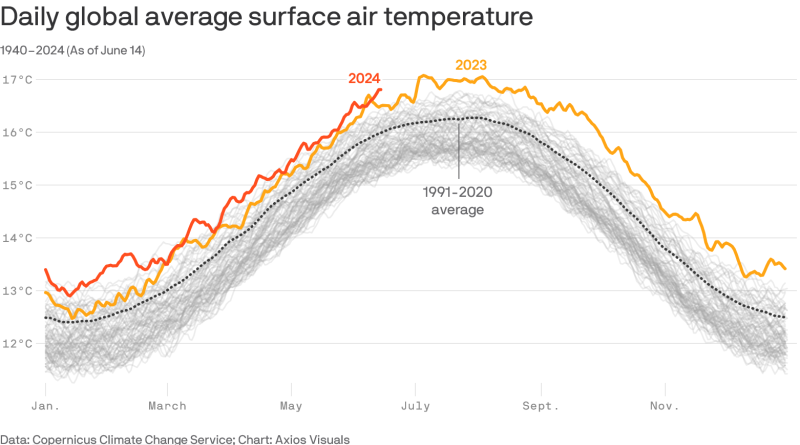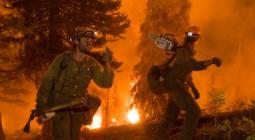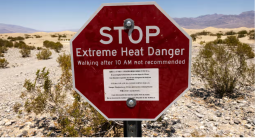Heat waves not just scorching U.S.

The U.S. is far from the only country seeing record heat, flash flooding and wildfires, among other extreme weather events. In fact, few places have been untouched recently.
Why it matters: Amid record warm global temperatures that have stretched on for at least a year, climate change-related extremes have affected hundreds of millions of people, with all-time heat records falling in parts of Europe, Africa and Asia.
The big picture: First, there's the early-summer heat. In the U.S., all-time heat records have been tied in Maine, where small towns on Wednesday had higher heat indices than Florida.
- For Thursday, extreme heat warnings and advisories are in effect for 100 million people across the country, with record-breaking heat expected to continue into early July in much of the Lower 48 states.
Outside the U.S., a particularly severe and long-lasting heat wave has gripped much of India and killed hundreds of people across the country.
- Delhi saw its hottest night ever recorded on Wednesday, with a low of just 35.2°C (95.4°F). Temperatures have reached or exceeded 40°C (104°F) in the city for 37 straight days, according to the Hindustan Times,
- The extreme heat has is also having a huge impact on animals. Officials in the city of Kanpur in the northern Indian state of Uttar Pradesh found multiple bats had dropped dead in trees after locals complained of a "foul smell" where the animals used to live, India Today reports.
Zoom in: In the Middle East, a searing heat wave struck Saudi Arabia during the Islamic Hajj pilgrimage to Mecca, with temperatures skyrocketing as high as 125°F.
- Heat-related deaths are estimated to be in the hundreds, although precise figures have been difficult to determine.
- Europe has already seen heat waves sweep across Greece and Sicily, imperiling tourism in both locations.
- The heat waves sweeping these regions this month have been made "at least five times more likely" because of human-caused climate change, according to a Climate Central analysis, using its "Climate Shift Index."
- A long-lasting and deadly heat wave in Mexico, Central America and the American Southwest was likely made about 1.4°C (2.52°F) hotter and about 35 times more likely due to climate change, according to a new study out Thursday.
The intrigue: In addition to heat waves, many countries have seen hydrological extremes as well, which are also becoming more common and intense as the world warms from burning fossil fuels for energy, among other causes.
- Japan had record rains in May and again in June, causing bullet trains to be suspended from the threat of landslides.
- Record heat has also affected Japan, with numerous monthly records set in mid-June.
- Europe has seen damaging flooding in Germany, while catastrophic flooding has swept through southern Brazil, displacing hundreds of thousands of people.
- A localized flash flood event inundated South Florida as well, with significant damage from Fort Lauderdale to Miami.
Between the lines: Parts of the U.S. have seen deadly instances of weather whiplash, too.
- Just two days after losing 1,400 structures in a fast-moving wildfire, the community of Ruidoso, N.M., saw damaging flash flooding as a severe thunderstorm sat on top of an area upriver.
- It dumped golf-ball sized hail along with heavy rains, sending torrents of water downstream prompting the National Weather Service to issue a rare "flash flood emergency."
Zoom out: The extreme events of the spring and summer 2024 have various ties to climate change.
- A bevy of studies show the strong links between heat waves and human-caused global warming, along with the relationship between more likely and intense heavy rainfall events, flooding and the increased amounts of greenhouse gases in the atmosphere.
- The extremes have occurred during what is, so far, the warmest year on record, even hotter on a global basis than 2023, which set the all-time record.
- The oceans are record warm, with a particularly alarming spike in temperatures observed in the North Atlantic Ocean.
June is likely to become the 13th-straight month of record-breaking heat across the globe.
- The extra heat in the oceans and atmosphere, along with the added moisture in the air, are manifesting in the record-setting and deadly extreme events seen so far this summer.
The bottom line: This is a trend that some scientists have taken to calling "global weirding" rather than global warming.
- A lot of dangerous weather and climate events are yet to come, including what is anticipated to be a potentially record-setting Atlantic hurricane season.
- In other words, get used to this.





